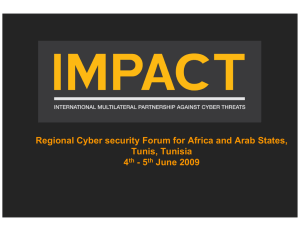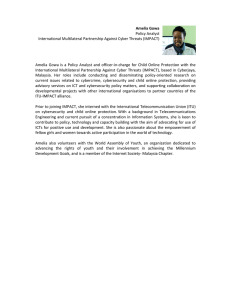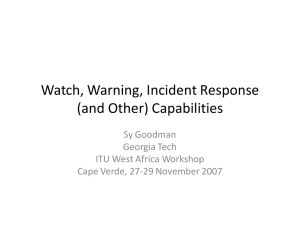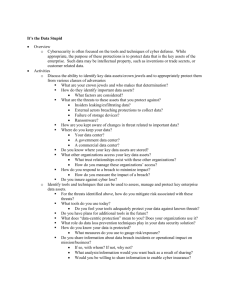Overview
advertisement
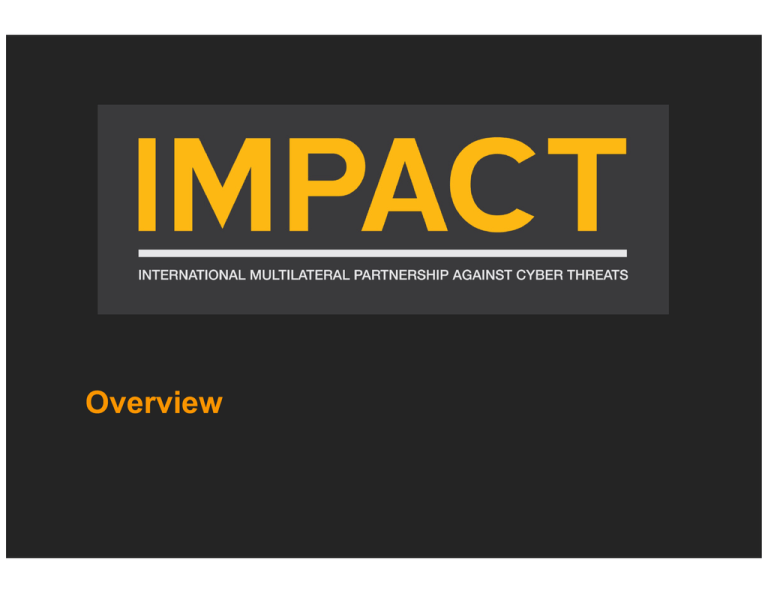
Overview We live in a highly connected world Image courtesy of chrisharrison.net Key Challenges 1. The more connected we are the more vulnerable we become– Critical Infrastructure, SCADA systems 2. Evolving cyber threats - The threat landscape has evolved 1) Focussed attacks becoming norm 2) Organised crime 3) Terrorist groups 3. Lack of concerted effort - Governments, businesses, and academia need to work together to effectively combat cyber threats 4. Cybersecurity is a dynamic field–Constant need for upgrading the skill sets Cyber Threats - Incidents • Estonia – Estonia, one of Europe’s most wired nations, found its government websites under sustained cyber attacks • Queensland, Australia – A disgruntled, unsuccessful job applicant to a waste management plant in Queensland sabotaged the plant’s computerised sewage control system • Japan – Malicious code targeted mobile phones to inundate the emergency hotline • Georgia – Major attack on Georgia’s IT infrastructure Combating Cyber Threats – Strategies • Providing effective information to empowered resources – Disseminating right information to the right people at the right time • Collaboration across borders at all levels – Individuals, law enforcement agencies, regulators and governments work together to effectively combat cyber threats • Capacity building – Harnessing knowledge from industry & academia to develop skilled individuals with the knowledge to combat cyber threats • Involvement of all stakeholders and academia–Industry and academia can play a vital role in helping governments secure national cyber infrastructure IMPACT International platform for governments + industry + academia to collaborate in cybersecurity and home of the International Telecommunication Union’s Global Cybersecurity Agenda Introduction to IMPACT – Characteristics • Non-profit organisation – funded by grants, contributions etc. • Focussed on ‘upper end of cyber threats’ – including cyber-terrorism • International & multilateral in nature – i.e. IMPACT is an international institution. Its partners are governments, its owners are the global community of partnernations. • Public-private partnership – Private sector, international institutions & academia are partners to assist partner countries secure their IT infrastructure. IMPACT Advisory Board IMPACT’s International Advisory Board comprises a distinguished list of renowned experts from industry and academia Eugene Kaspersky Founder & CEO of Kaspersky Lab Dr. Vinton Cerf Chief Internet Evangelist of Google, ‘Father of the Internet’ Prof. Fred Piper Professor of Mathematics at University of London & Founder of Codes & Ciphers Ltd. Steve Chang Founder & Chairman of Trend Micro Prof. Howard Schmidt Former White House Security Advisor, Former Chief Security Officer of Microsoft and eBay Ayman Hariri Chairman of Oger Systems John W. Thompson Chairman Symantec Corp. Mikko Hypponen Chief Research Officer of F-Secure Dr. Hamadoun Touré Secretary-General of International Telecommunication Union (ITU) Chaired by Prime Minister of Malaysia (2008 – 2011) IMPACT Activities • Global Response Centre • Centre for Training & Skills Development • Centre for Security Assurance & Research • Centre for Policy & International Cooperation Partnership with ITU September 3, 2008 (Bangkok, Thailand) : ITU signs an MoU with IMPACT to operationalise its Global Cybersecurity Agenda (GCA) initiative. IMPACT HQ in Cyberjaya will be the new physical home for ITU’s GCA IMPACT confers full-fledged access to 191 countries BotNet toolkit with ITU: Malaysia is the test site for ITU’s BotNet toolkit. IMPACT is helping co-ordinate with various agencies. Operationalising COP: IMPACT is to help in operationalising ITU’s COP (child online protection) program Special report for UN/ITU: Every quarter IMPACT prepares a special report on the global cyber-threat landscape. Summary – How do partner countries benefit? • Global Response Centre – NEWS and ESCAPE – Access to threat information and collaboration platform • Training Programs – SANS/EC Council Scholarships/Other IMPACT courses • Security Assurance – IGSS & CIRT Lite • Research – University participation Questions
